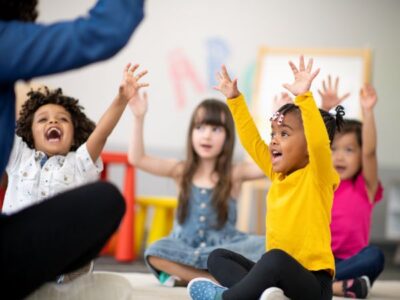‘Thinking about the whole family right away’
Hub grant aims to connect families with services
The Northwest Minnesota Foundation is committed to strengthening support for children and families throughout our region.
As one of our three key drives, that commitment to our region’s children propels several of our internal programs and initiatives.
One of these is our Hub grant. In 2021, NMF was awarded a two-year grant through the Minnesota Department of Human Services to develop a system through which families would be connected to services.
The goal of the Hub grant is three-fold: make it easier for families to get what they need; increase access to services; and grow community engagement and support community-developed services.
The best way to illustrate how that work is actually accomplished through NMF is to first reflect on the definition of a hub itself:
noun
- The central part of a wheel, rotating on or with the axle, and from which the spokes radiate.
- The effective center of an activity, region, or network.
NMF, as the grant recipient, is charged with carrying out the state’s goal of developing a Hub model through which families can be connected to services. NMF contracts with community partners throughout Northwest Minnesota, who then work directly with families to provide the supports and services needed.
Kari Cooper, an NMF program officer, acts as the program manager – serving as the point of contact with the Minnesota Department of Human Services – and then communicates and works with the “hubs,” six partner agencies that cover our region:
- Bi-CAP: Beltrami and Cass counties
- Inter-County Community Council: Clearwater, East Polk, Red Lake, and Pennington counties
- MAHUBE-OTWA: Mahnomen, Hubbard, Becker, Otter Tail, and Wadena counties
- Northwest Community Action: Kittson, Roseau, Marshall, and Lake of the Woods counties
- Red Lake Nation: serving Red Lake Tribal Nation and its enrolled members throughout the state
- Tri-Valley Opportunity Council: Marshall, West Polk, and Norman counties
Hub grant outreach efforts in Year 1 in Northwest Minnesota
(April 1, 2021 through December 30, 2021):
- Number of families referred to services: 327
- Inquiries: 954
Note: There are a multitude of reasons why everyone is not referred to services immediately. For example, requests for child care and housing cannot always be fulfilled, as our region does not have the capacity to immediately meet those needs. Others might come in seeking help but do not want to go through the intake process.

HOW IT WORKS:
Mahube-Otwa
The work funded through the Hub grant is not necessarily new, explained Dana Patsie, the director of child care programs at Mahube-Otwa. But it does fund additional, more targeted outreach.
“Mahube tries to connect clients to resources every day,” she said. “Our Head Start families have wrap-around services – (such as) their family service worker, their home visitor, the center staff – so we’ve been doing that connection work for as long as we’ve been in existence.”
With the Hub funding, Mahube-Otwa has strengthened its focus on implementing a whole family approach to services. For example, if someone applies for energy assistance, there is more consideration and follow-up rather than just looking at the energy assistance application for approval or denial.
“We might see they have a senior in the household and say, ‘Do you know about our senior programs?’ … or, if they are eligible for Head Start, they’re most likely eligible for so many other things – medical assistance, food support,” Patsie said. “We are just thinking about the whole family right away, rather than waiting for them to come back. It seemed like a really good fit.”
An initial challenge has been staffing levels needed to capture all of the necessary data across all of their offices and programs, so the focus thus far has been capturing data through early learning scholarship families in Mahnomen and Hubbard counties.
“We’ve been reaching out to them, those that we’ve awarded – those that are on a ‘need more information’ list, those that we deny – and connect with them to let them know that we could do a screening for services, if they’re in need of (supports).”
HOW IT WORKS:
Red Lake Nation
Ruby Gurneau is the child care development director for Red Lake Nation. She works at the new Red Lake Child Development Center along Highway 1, which opened in January 2021.
Her work is centered around child care, including not just the center but also the child care providers throughout Red Lake. The number of providers fluctuate, but in February there were 45 providers in addition to the child care center, which can accommodate around 40 children.
Through her position, she is able to help pass along information about available services and supports to all the providers to can then, in turn, get it out to their families.
“When I get the information here, I print it out so I can give it to the providers and let them know that if they want copies for their families, they can let me know and I can add that to their list,” she said.
Information that is shared with young families is robust: The March newsletter from the child care center was 10 pages and included detailed explanations about how to do a safety check of car seats, why art education is key an important component of early childhood education, and a month-long calendar full of tips for how to keep children and families moving and active.
Gurneau also utilizes a Facebook page, through which she disseminates information through social media.
Red Lake Nation has staff available at Oshkiimaajitahdah in Redby to help families and individuals apply for services and supports.
The work supported through the Hub grant for Red Lake Nation extends beyond the boundaries of the Red Lake reservation. In the state’s grant report on activities funded through its Preschool Development Grant (which includes the Hub grants), they highlighted an effort of Red Lake Nation as a Community Resource Hub Spotlight:
Red Lake Nation purchased two shuttle buses to expand their Ombimindwaa Gidinawemaaganinaadog (“Uplifting Our Relatives”) program to their Minneapolis urban office for Red Lake Nation citizens and descendants. The program includes cultural services, intake and response, family preservation, reunification, assessment and referral, counseling and rehabilitative services along with case managers and Indian Child Welfare Act team members.




